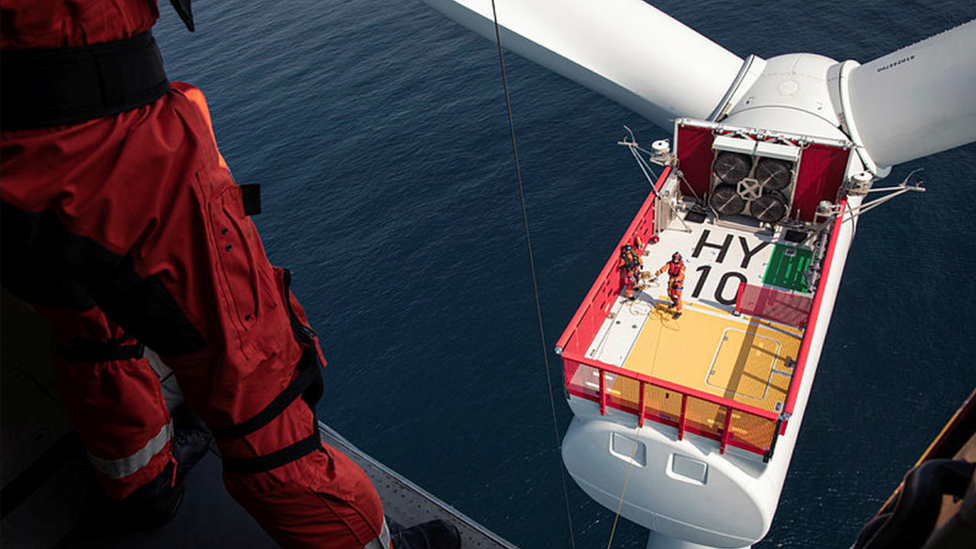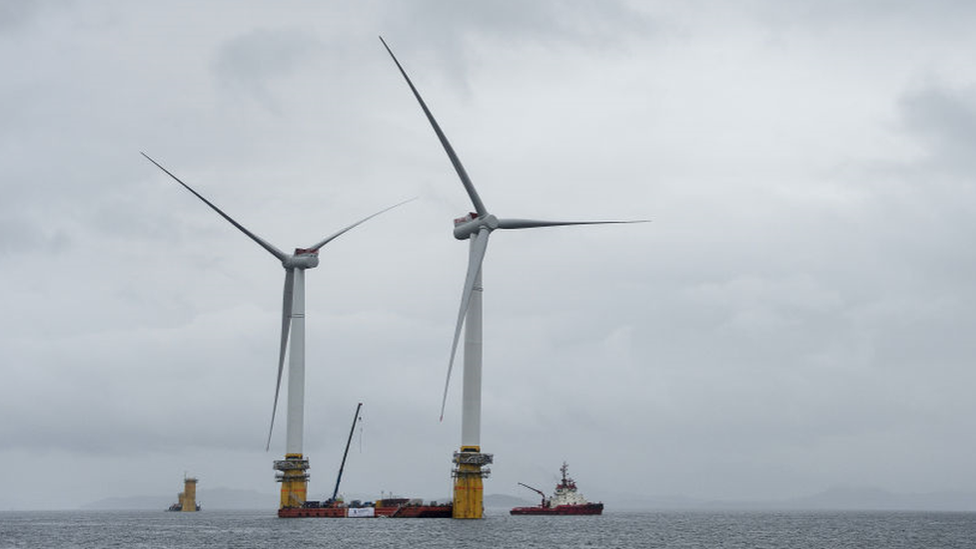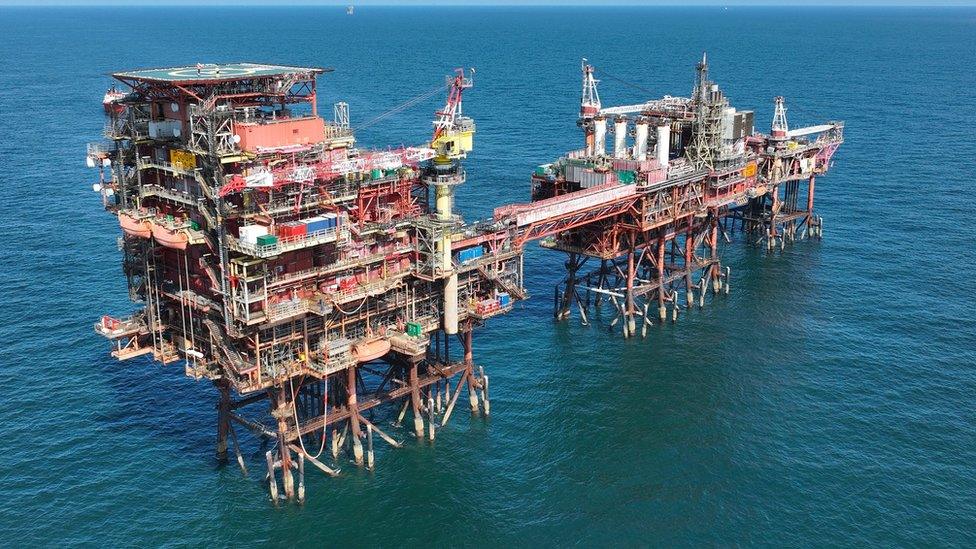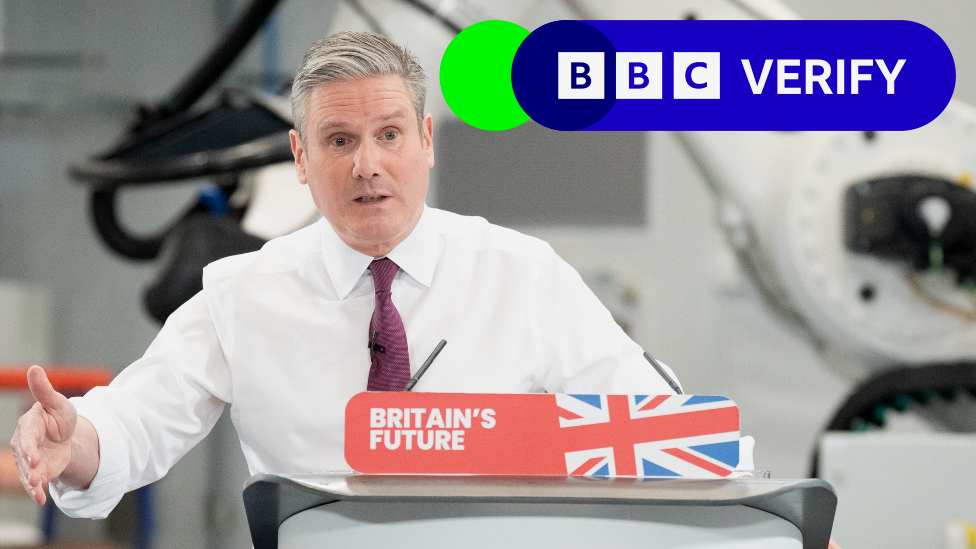Labour targets floating wind farms to boost energy security
- Published
- comments

Labour is planning to invest in building floating wind farms off Britain's coast to reduce the UK's reliance on foreign energy.
Sir Keir Starmer has announced Labour will set up a state-owned firm with a £8.3bn budget which it claims will help cut energy bills and create jobs.
Labour has pledged to decarbonise the UK by 2030, while the Conservatives target 2035 for net zero energy supply.
The Tories said Labour's plan was "unfunded" and would mean higher taxes.
Ahead of a general election, Labour and the Conservatives have pledged to make the UK's energy supply more secure after the price shocks that followed Russia's invasion of Ukraine.
At a port in North Wales, Sir Keir announced on Monday that Great British Energy, a publicly-owned company, will fund the construction of floating offshore wind farms.
"In an increasingly insecure world, with tyrants using energy as an economic weapon, Britain must take back control of our national energy security." he will say.
The most recent figures show that the UK imported nearly 40% of its energy in 2022.
Sir Keir said: "Here in Wales, the potential for offshore wind is enormous, and the UK Tory government is squandering it. With public investment through Great British Energy we can unlock billions more in private investment to turbocharge jobs and growth for Wales."
But Energy Secretary Claire Coutinho, said "Sir Keir Starmer can't say what he will do to protect our energy security because he does not have a plan - he set out a 2030 decarbonisation promise, which Labour themselves costed at £28bn without a plan to pay for it."
Labour recently dropped a pledge to spend £28bn a year on environmental projects if it wins the general election, which must be held by 28 January, 2025.
Sir Keir blamed the "damage the Tories have done to the economy" for the U-turn. But he promised to stick to other commitments including battery factories and wind farms with British-made turbines.
He also stood by Labour's 2030 timeline, telling the BBC that while it was a "difficult target" it is "important", adding that it is key to have a deadline to work towards.
Adrian Ramsay, co-leader of the Green Party, described Labour's £8.3bn investment plan as "a drop in the ocean".
"Especially since it follows the Party ditching its £28bn a year green investment plan," he said. "The Green Party would invest whatever is needed to turbocharge the move to renewables, ensuring wind provides around 70% of the UK's electricity by 2030."
Floating wind farms are a relatively new means of generating renewable energy with very few in operation. The first was built off the coast of Peterhead in Scotland and consists of five wind turbines, led by Norwegian firm Equinor.

There is a floating wind farm off the coast of Scotland
Floating farms allow turbines to be placed further out at sea, where wind speeds may be greater, unlike traditional wind farms which are fixed to the seabed usually in waters less than 60 metres deep. The floating turbines off the coast of Aberdeen are kept in place using three suction anchors attached to each turbine.
As well as offshore wind, Labour said they would veto any new oil and gas licences in UK waters if elected.
The Conservatives plan to continue granting fossil fuel permits and have a 2035 target for net zero energy supplies. The government insists that rejecting future UK based oil and gas production will cost jobs and jeopardise UK energy security.
Sir Keir said: "So far as oil and gas licenses are concerned, we've been very clear we're not going to revoke or interfere with any existing licenses so they will be a part of the mix for decades to come.
"But clean power is the way to ensure we get lower bills for the long term, that we get the stability and security we need, so Putin can't put his boot on our throat, but crucially so we get the next generation of jobs."
The Liberal Democrats also back a 2030 target for net zero energy supplies. Lib Dem leader Ed Davey told the BBC: "We are super-committed to fast-tracking action on net zero, not least because it could both reduce people's energy bills and make the UK more energy independent."
Plaid Cymru described Labour's plan as "unambitious" and "re-hashed". Labour first announced its plan to create the Great British Energy company in September 2022.
- Published12 March 2024

- Published8 February 2024
